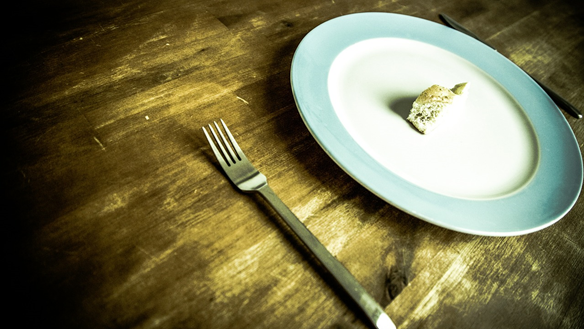The Truth About Gastroparesis: The Improper Emptying of the Stomach
April 17, 2015 in Stories by Trisha Bundy
Today has been an absolutely horrible day! I am in so much pain, battling intense nausea, and unable to run my tube feeds. What does that mean? I am literally running on fumes with no nutrition. I can't eat, I can't drink, and I am having trouble tube feeding myself - but I have to keep fighting!
I have to pretend to be strong for my children. My daughter is amazing, but it breaks my heart to see her cry, hear her pleas for me to feel better, listen to her offering special magic hugs, and even rubbing my back as she tries to comfort me. I hate seeing her feel like a failure because she can't help me feel better. She is 10 years old and should be loving life, not worrying about me. My son is more quiet and reserved, but worries daily about me as well. They are too young and should be loving life! But that is what this disease has done to our family. So while fighting my pain, nausea, and fatigue, I will continue fighting for Gastroparesis awareness.
The Gastroparesis community and I are dealing with the debilitating symptoms of Gastroparesis daily. All of our symptoms are individualized and can include, but not limited to, abdominal pain, bloating, distention, nausea, vomiting/heaving, early satiety, inability to eat, weight changes, malnutrition, and fatigue. But still, we are trying to pave a brighter path for ourselves and others by advocating for a change.
Treatment Options for Gastroparesis
Yes, we have some good days, but the bad days keep right on coming as our treatment options dwindle. Many of us have tried a variety of medicines; many only slightly effective, if effective at all, to treat the nausea and pain.
Gastroparesis means "paralyzed stomach", therefore some medicines are usually attempted to help improve gastric emptying. Reglan (with FDA warning), Domperidone (not FDA approved and must be purchased from oversee providers), and some antibiotics are the most common. Once again, these efforts work well for some, but not at all for others.
Other medicines such as Remeron, Neurotin, Desipramine, and Buspar are sometimes used for "off label" purposes to help treat symptoms. Sometimes patients, including me, are unable to receive adequate attention orally and need feeding tubes that feed directly into the small intestine or veins - both of which carry their own risk. Other surgeries are patient dependent and not widely deemed effective. These may include the stomach "pacemaker" (GES), pylorplasty, botox, or bariatric surgeries.
Testing and Support for Gastroparesis
If you believe that you or a loved one may have Gastroparesis, ask your gastroenterologist. It's quite possible that they may not have thought about it. Ask for a Gastric Emptying Study or the new FDA approved breath test. Don't give up! Be persistant if need be.
If you've been diagnosed, know you are not alone. Reach out to an online support group. The connections and friendships formed via social media (whether it be from Facebook, Sharespot, Twitter, Inspire, etc) are valued greatly by me. Not only has my social media sites allowed me to share information about Gastroparesis, but they also offer me an outlet to vent about the debilitating symptoms, lack of understanding from others, and guilt from missing out on special activities with my family. Additionally, I am able to listen to others' stories and share advice at times. These friendships allow me a chance to be the "real" me and not have to put on a brave mask. From these friendships, I became an active member and co-admin for our Gastroparesis: Fighting for Change advocacy group.
Our advocacy group has also become a very important part of my life. Advocating for Gastroparesis awareness has made me more courageous! I used to try and hide this already invisible disease, but no longer! I want the world to understand and "see" what this disease does to people.
The Uphill Battle for Gastroparesis Awareness and Research
I have been sharing my story on The Sharespot, Facebook, Twitter, and even in emails to various media sources across the United States. I may be unable to physically function as I would like, but mentally, and with technology, I can fight to have our GP voice heard. Before becoming an advocate, I despised Twitter, but no longer. I have now become successful at participating in TweetChats with doctors, authors, researchers, other patients, etc, all in an effort to spread the importance of awareness and research for Gastroparesis.
Unfortunately, though we have made a little progress, we are still fighting a very steep upward battle! We are meeting obstacles that we never envisioned. To begin with, we believed that stepping out of our comfort zone and sharing our inner selves and very personal experiences would be our most difficult obstacle. Wow, were we wrong! Yes, that hurdle was difficult, but actually became empowering and therapeutic. Sharing my personal GP story is second nature for me now. I no longer hesitate.
We never expected a "concrete" wall to hinder us. We are being told that our stories, our GP message, our awareness tactics are not news worthy because they are "too gross", "too sad", "too frightening", or "not what the public wants to read." Seriously? That is like saying we are too gross or unworthy to receive help.
The majority of the public and even many medical providers have not heard of Gastroparesis. They don't understand the struggles that we go through daily, not only physically, but emotionally. Many times we are left feeling alone, as others, including our own families and friends, don't understand and can't comprehend how we can feel. The best way we can explain it is to compare it to a bad case of the stomach flu that never goes away. Sometimes we are judged, mocked, or even ignored by medical providers, simply because they are not familiar with Gastroparesis and unsure how to help us. There are times when we literally have to educate our doctors and nurses, telling them what we need and what we'd like to try. Some of us are lucky and have a great doctor that listens and understands, but with time, runs out of ideas. Can you imagine being told, "We don't know how to treat you", or, "We are running out of options"? Our GP community hears these comments much too often! If doctors can't help us, who can?
So, sorry if I have to live everyday with running my "meals" in a tube. Sorry if others don't want to hear that a couple bites of food can make me feel like I'm on a death bed. Sorry if our GP community is literally starving to death. Sorry if our GP community includes real life skeletons. Sorry if we vomit or heave on a daily basis. Sorry if we don't know if we will be able to get out of the house tomorrow. Sorry if we don't always smile and laugh when fighting our inner battles. Sorry if we are literally spending all of our energy to survive. Sorry if we try to make our voices heard. Sorry if we are crying in tears of pain or frustration! Sorry if we don't have enough positivity in our stories. Sorry if we feel defeated because our current treatment options are not working or we have run out of treatment options. Sorry if we keep fighting for awareness and research because there is no cure for Gastroparesis! Sorry that we are human and don't fit into a pretty little box.
Gastroparesis is not a pretty disease. It is not curable, friendly, nor positive. It is painful and often debilitating. It is individualized. It is under-recognized and invisible to outsiders. It is destructive, and difficult to describe and understand. It is life altering, and it is our life.
We need help. We need awareness. We need a voice for the public! We need support. We need others to know that they are not alone!
More information on Gastroparesis
I have to pretend to be strong for my children. My daughter is amazing, but it breaks my heart to see her cry, hear her pleas for me to feel better, listen to her offering special magic hugs, and even rubbing my back as she tries to comfort me. I hate seeing her feel like a failure because she can't help me feel better. She is 10 years old and should be loving life, not worrying about me. My son is more quiet and reserved, but worries daily about me as well. They are too young and should be loving life! But that is what this disease has done to our family. So while fighting my pain, nausea, and fatigue, I will continue fighting for Gastroparesis awareness.
The Gastroparesis community and I are dealing with the debilitating symptoms of Gastroparesis daily. All of our symptoms are individualized and can include, but not limited to, abdominal pain, bloating, distention, nausea, vomiting/heaving, early satiety, inability to eat, weight changes, malnutrition, and fatigue. But still, we are trying to pave a brighter path for ourselves and others by advocating for a change.
Treatment Options for Gastroparesis
Yes, we have some good days, but the bad days keep right on coming as our treatment options dwindle. Many of us have tried a variety of medicines; many only slightly effective, if effective at all, to treat the nausea and pain.
Gastroparesis means "paralyzed stomach", therefore some medicines are usually attempted to help improve gastric emptying. Reglan (with FDA warning), Domperidone (not FDA approved and must be purchased from oversee providers), and some antibiotics are the most common. Once again, these efforts work well for some, but not at all for others.
Other medicines such as Remeron, Neurotin, Desipramine, and Buspar are sometimes used for "off label" purposes to help treat symptoms. Sometimes patients, including me, are unable to receive adequate attention orally and need feeding tubes that feed directly into the small intestine or veins - both of which carry their own risk. Other surgeries are patient dependent and not widely deemed effective. These may include the stomach "pacemaker" (GES), pylorplasty, botox, or bariatric surgeries.
Testing and Support for Gastroparesis
If you believe that you or a loved one may have Gastroparesis, ask your gastroenterologist. It's quite possible that they may not have thought about it. Ask for a Gastric Emptying Study or the new FDA approved breath test. Don't give up! Be persistant if need be.
If you've been diagnosed, know you are not alone. Reach out to an online support group. The connections and friendships formed via social media (whether it be from Facebook, Sharespot, Twitter, Inspire, etc) are valued greatly by me. Not only has my social media sites allowed me to share information about Gastroparesis, but they also offer me an outlet to vent about the debilitating symptoms, lack of understanding from others, and guilt from missing out on special activities with my family. Additionally, I am able to listen to others' stories and share advice at times. These friendships allow me a chance to be the "real" me and not have to put on a brave mask. From these friendships, I became an active member and co-admin for our Gastroparesis: Fighting for Change advocacy group.
Our advocacy group has also become a very important part of my life. Advocating for Gastroparesis awareness has made me more courageous! I used to try and hide this already invisible disease, but no longer! I want the world to understand and "see" what this disease does to people.
The Uphill Battle for Gastroparesis Awareness and Research
I have been sharing my story on The Sharespot, Facebook, Twitter, and even in emails to various media sources across the United States. I may be unable to physically function as I would like, but mentally, and with technology, I can fight to have our GP voice heard. Before becoming an advocate, I despised Twitter, but no longer. I have now become successful at participating in TweetChats with doctors, authors, researchers, other patients, etc, all in an effort to spread the importance of awareness and research for Gastroparesis.
Unfortunately, though we have made a little progress, we are still fighting a very steep upward battle! We are meeting obstacles that we never envisioned. To begin with, we believed that stepping out of our comfort zone and sharing our inner selves and very personal experiences would be our most difficult obstacle. Wow, were we wrong! Yes, that hurdle was difficult, but actually became empowering and therapeutic. Sharing my personal GP story is second nature for me now. I no longer hesitate.
We never expected a "concrete" wall to hinder us. We are being told that our stories, our GP message, our awareness tactics are not news worthy because they are "too gross", "too sad", "too frightening", or "not what the public wants to read." Seriously? That is like saying we are too gross or unworthy to receive help.
The majority of the public and even many medical providers have not heard of Gastroparesis. They don't understand the struggles that we go through daily, not only physically, but emotionally. Many times we are left feeling alone, as others, including our own families and friends, don't understand and can't comprehend how we can feel. The best way we can explain it is to compare it to a bad case of the stomach flu that never goes away. Sometimes we are judged, mocked, or even ignored by medical providers, simply because they are not familiar with Gastroparesis and unsure how to help us. There are times when we literally have to educate our doctors and nurses, telling them what we need and what we'd like to try. Some of us are lucky and have a great doctor that listens and understands, but with time, runs out of ideas. Can you imagine being told, "We don't know how to treat you", or, "We are running out of options"? Our GP community hears these comments much too often! If doctors can't help us, who can?
So, sorry if I have to live everyday with running my "meals" in a tube. Sorry if others don't want to hear that a couple bites of food can make me feel like I'm on a death bed. Sorry if our GP community is literally starving to death. Sorry if our GP community includes real life skeletons. Sorry if we vomit or heave on a daily basis. Sorry if we don't know if we will be able to get out of the house tomorrow. Sorry if we don't always smile and laugh when fighting our inner battles. Sorry if we are literally spending all of our energy to survive. Sorry if we try to make our voices heard. Sorry if we are crying in tears of pain or frustration! Sorry if we don't have enough positivity in our stories. Sorry if we feel defeated because our current treatment options are not working or we have run out of treatment options. Sorry if we keep fighting for awareness and research because there is no cure for Gastroparesis! Sorry that we are human and don't fit into a pretty little box.
Gastroparesis is not a pretty disease. It is not curable, friendly, nor positive. It is painful and often debilitating. It is individualized. It is under-recognized and invisible to outsiders. It is destructive, and difficult to describe and understand. It is life altering, and it is our life.
We need help. We need awareness. We need a voice for the public! We need support. We need others to know that they are not alone!
More information on Gastroparesis
About the author
Trisha is a happily married mother of 3 awesome kids, which are her life-line, and a fifth grade teacher. As a result of having Gastroparesis, she became active in online support groups. Witnessing the struggles of others, as well as her own, led her to become an advocate for Gastroparesis and Tubies.
You can follow Trisha on Twitter @bundytr5.
You can follow Trisha on Twitter @bundytr5.
latest posts
tags
Disclaimer: The information on this website is not a substitute for professional medical advice.
Always consult with your treating physician before altering any treatment protocol.
Always consult with your treating physician before altering any treatment protocol.








